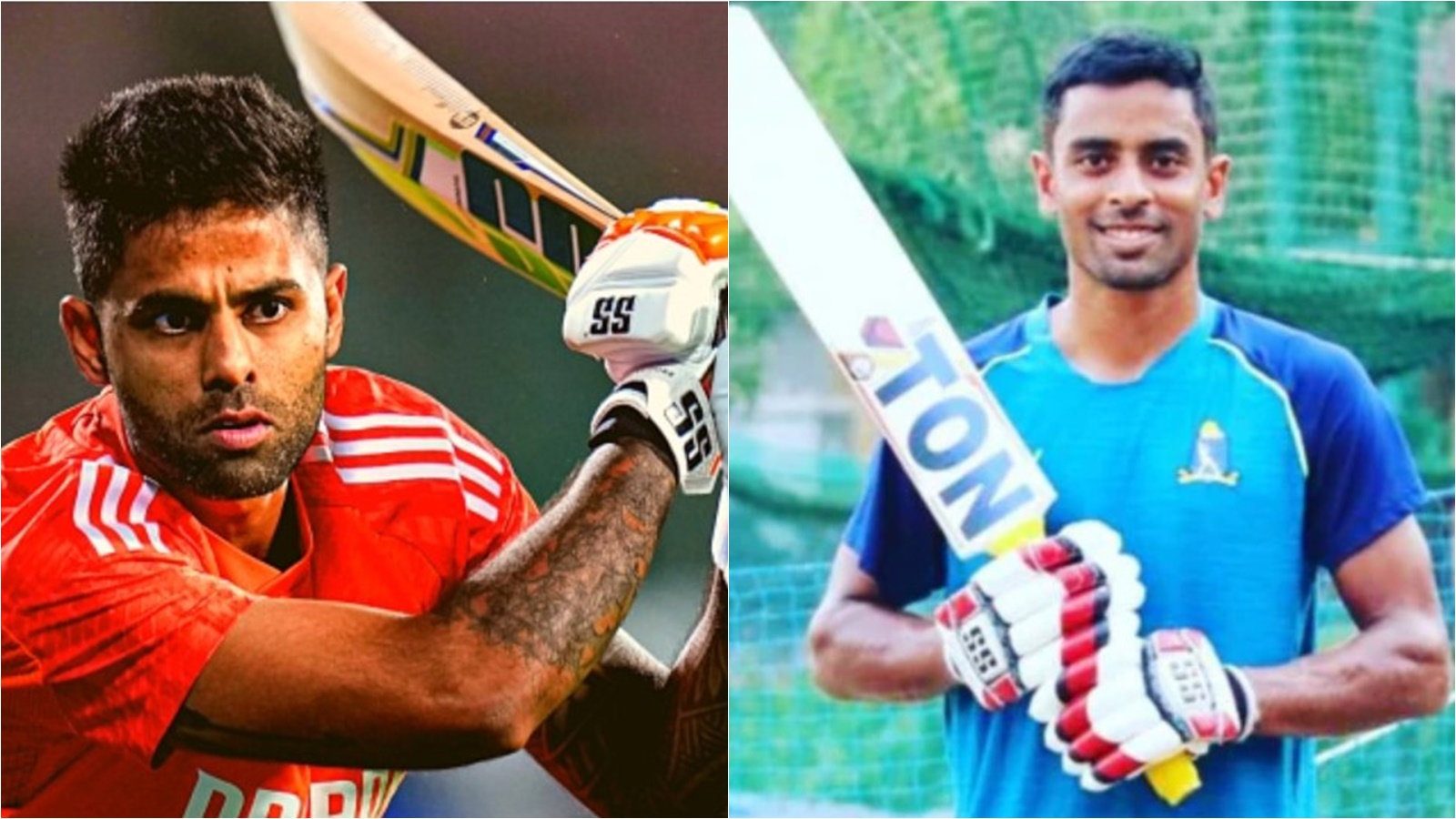The burly men under the sprawling gulmohar tree were stretching their legs and stifling their yawns when Suryakumar Yadav bristled onto the ground, shortly after lunch. The half-sleepy audience sat transfixed in the aura of a cricketing superstar making a rare appearance in a featureless mofussil town.
Everything else blurred into the backdrop, the strokeful hundred of Sanju Samson a distant memory, the crisp stroke-play of Abhimanyu Easwaran, whose twenty fifth first-class hundred that composed the spine of India B’s 210 for 6 in response to India D’s 349, rendered utterly immaterial. This was what they wanted to watch. Yadav with the bat that he often wields as both a compass, in its sweeping reach, and a scalpel, in its cold-eyed accuracy. As he took guard, they chewed their nails and fretted on the seats waiting for the Yadav show to begin. And he walked out like a matinee idol, with a twinkling halo.
But like overhyped, but clumsy superstar movies, the Yadav flick in Anantapur, the district’s notorious caste wars a fodder for several gory Telugu blockbusters, was not so much an unwise cameo as a meaningless trailer. Featuring in his first red-ball game in 14 months, he betrayed his rusted mindset in this format. The 15-ball five runs was as schizophrenic an exhibition of batting in this format as his lone appearance in Tests, in Nagpur against Australia.
The first ball he faced here was short and into his body from around the stumps, delivered by Arshdeep Singh, fresh from nailing Musheer Khan with a late in-swinging beaut. Yadav couldn’t resist pulling, even though his feet had not kicked into fluency. But he was a trifle too late on the shot for his own good. He though didn’t take a step back when the tails-up left-arm seamer followed up with a fuller length ball. The front foot bursting out, he creamed the ball through covers.
The batsman’s nerves seemed to settle. He defended the next few balls with authority, including an in-swinger that bent late into him, on the front-foot without a drop of uneasiness. A single was threaded through the gaps, before chaos seized him. He attempted to pull another shot ball, from the part of the pitch with double bounce, under-edged it towards the keeper, Samson. But the umpire deemed the ball had bounced before the catch was grabbed. Two balls later, he threw his hands at a wide ball and nicked one, only for Ricky Bhui to shell a routine catch at second slip.
The crowd breathed a sigh of relief. Yadav, they wished, would see off the stormy passage and bat long. He affirmed their wish with a few dead defensive pushes. But the charmed existence was short-lived. Arshdeep pushed one fuller, outside the off-stump, inviting the drive. So he did and spooned to cover. He hung his head in dismay, he has fluffed another opportunity to exhibit his red-ball worth.
Like pigeons upon a gunshot, the crowd scattered. But those that lingered after the Surya slapdash no-show were rewarded with a hundred in tune with red-ball traditions. The Bengal opener Abhimantyu’s is a name you notice on scorecards rather than inhabits the consciousness of cricket fans. He doesn’t inspire a bidding war on the auction table; he doesn’t improvise, he doesn’t dispatch the ball to unusual corners of the ground.
But watch him in isolation, without predetermined eyes, here is a watchable player with a sturdy technique, dexterous hands against spinners and precise footwork against seamers. Upholding conventional ethos, he leans onto his drives, cuts delectably on the back foot, and scores runs at a steady clip, like how wordly-wise batsmen go about in red-ball cricket. He repelled the new-ball spell of Arshdeep with utmost certainty, reading the movement accurately and blunting him with a mean, minimalistic forward stride.
Contrary to perceptions about openers in domestic cricket, he is not an outright stonewaller as many think he is. His 116, for instance, consumed only 170 balls. A strike rate of 68 is quite brisk in this format. His 157 in the previous outing was accrued at a rate of 54. He didn’t spare even the semi-loose balls, essayed 13 risk-free fours, several of them sweeps off spinners picked from middle stump, and was brutal on them. Before lunch left-arm spinner Saurabh Kumar had settled into a sinister rhythm but he dishevelled him with sweeps, hit fine, and once dispatched him over the mid-wicket fence.
In cue with his rich vein of form—this was his third hundred in six innings—and with his predilection for daddy hundreds, he was gutted when he got out. He was convinced the ball had brushed his thigh pad rather than his hand, but it revealed his appetite for big scores.
The careers of Yadav and Easwaran are an intriguing case study. They are more or less contemporaries—Yadav debuted in 2010 and Easwaran three years later. Until Yadav discovered his T20 djinn, they were stacked together as the next line of India’s red-ball cricketers. From 2014 to 2018, they matched each other. Thereon, their paths diverged. Yadav became a T20 colossus, as Easwaran’s red-ball form slipped. In the 2019-20 Ranji season, just around the time he was getting more India A exposure, he endured a torrid season (average of 23). Post pandemic, he revived, averaging 56 in 32 games since 2021. But it was Yadav—who had featured in only 25 first-class games and maintained an average of 34 in the last seven years —who has a Test appearance to his name.
Yet, cruelly, the crowd would remember Yadav’s 15-ball five more than Easwaran’s glorious 116. Like a clumsy superstar movie might often obliterate a budget movie with a cohesive script and performance.



